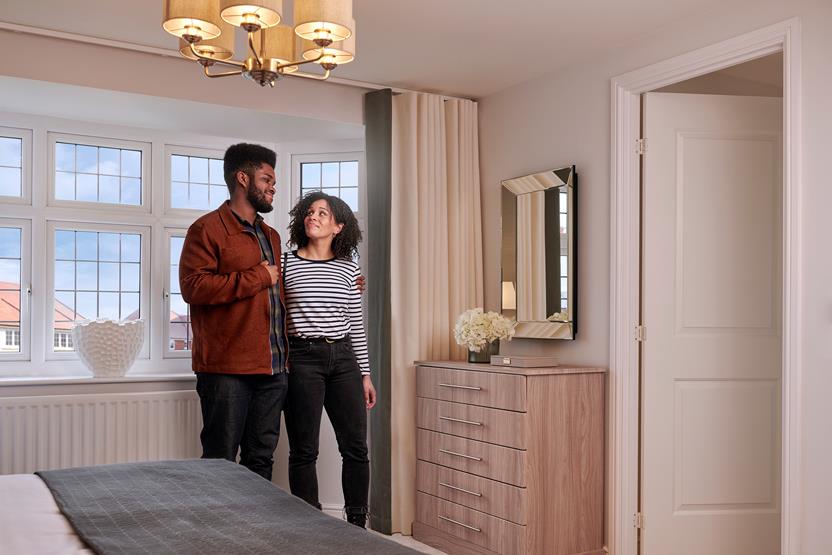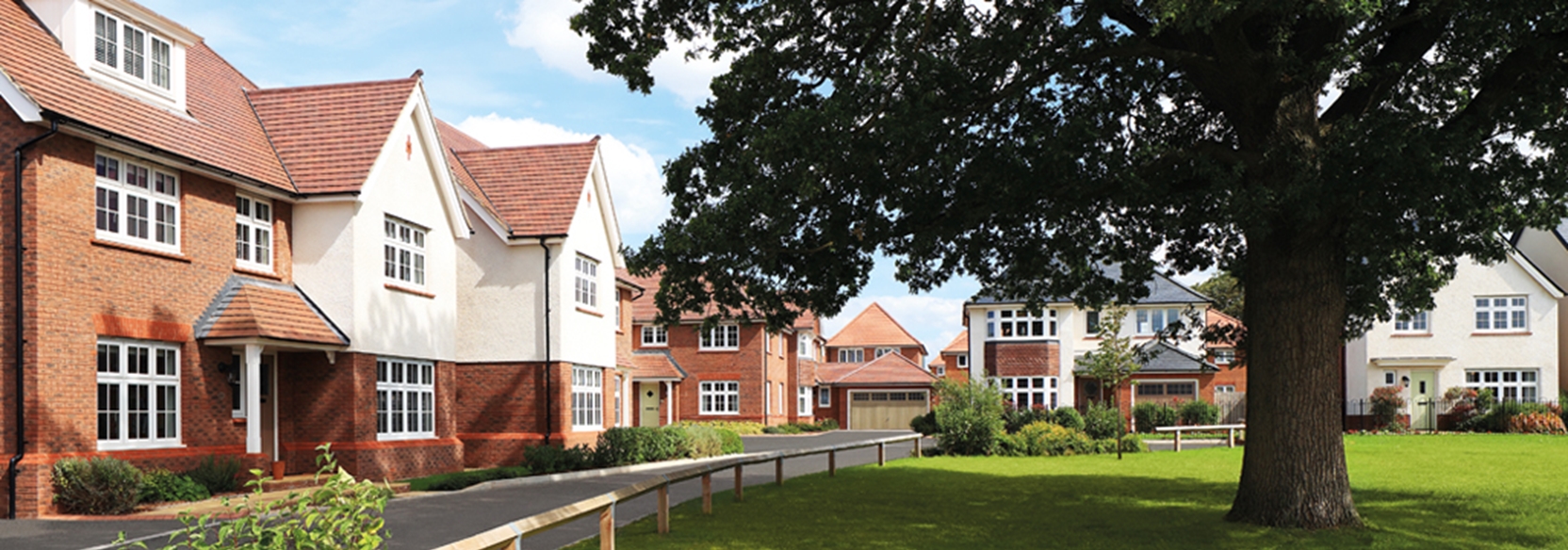
At Redrow we use our planning and design skills to develop our quality land holdings into well-designed, sustainable and vibrant places to live.
The Importance of Placemaking
The renewed focus of Central Government on placemaking and the delivery of beautiful places to live has in the last 12 months seen the publication of the National Design Guide (NDG) in October 2019 as well as the final report of the Building Better, Building Beautiful Commission at the end of January 2020.
At Redrow we are very well-placed to embrace this new agenda and on publication of the NDG we refined our assessment criteria for our internal placemaking scoring system (the Redrow 8) to reflect the key characteristics of well-designed places set out in the Government guidance.
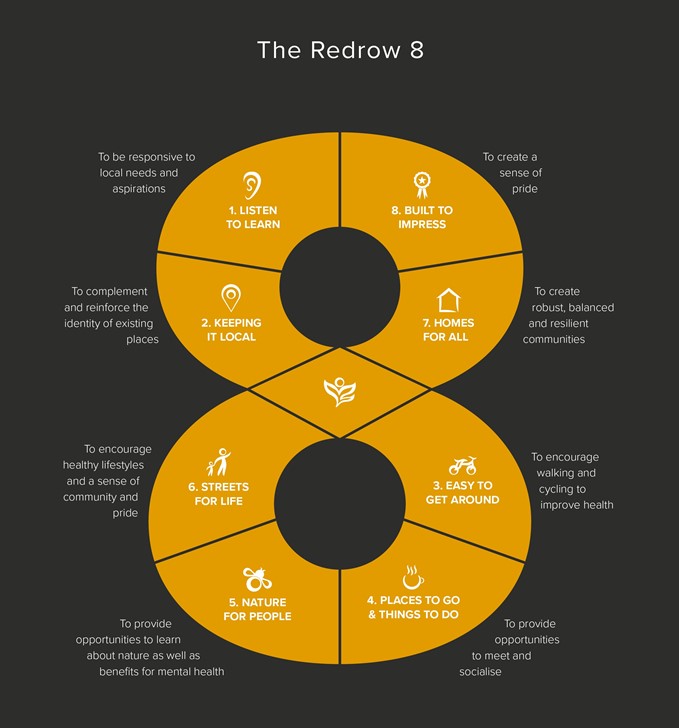
Our placemaking principles are embedded into how we approach all of our new developments and this year our Group Master Planning Team held two design seminars for all of our design managers to share and discuss best practice and how we can deliver places of the highest quality. This sharing of ideas and best practice was supplemented by the launch of our placemaking e-learning course for all staff, designed to further develop their knowledge of key placemaking and urban design principles and how they are to be applied to our new communities.
We have compiled two new comprehensive design manuals, one for use by our divisional teams and one for use by external design consultants engaged to assist in the design of our new developments. The manuals cover all aspects of site layout and landscaping and are rooted in the delivery of our placemaking principles, ensuring that every design decision we make contributes to the creation of a successful and beautiful place to live. The new manuals also reflect and address the latest requirements for biodiversity net gain and the focus on creating sustainable places to live.
We are changing our approach to landscaping to create more natural, wildlife friendly planting designs which complement our beautiful homes. For example, at our Woodford development, we have seeded and planted the swales with wildflower mixes, grasses and more mature trees giving a less ornamental and more natural feel to these areas.
Our Group Master Planning team is responsible for working with all of our divisions to promote our placemaking approach and to advise on how emerging schemes might be revised or refined to ensure that we deliver the best quality place we can on each site. This includes regular project design review process and assessment of emerging layouts against our 8 placemaking principles. Our Redrow 8 scoring system means that we can assess a project at a number of stages from the drawing board to delivery on site to test and review our progress against our urban design objectives. The scoring system also provides a ‘health and wellbeing’ score based on how the place encourages social interaction, provides for walking and cycling, incorporates nature as well as providing attractive green spaces.
Communicating our placemaking vision to our customers is important to us. To assist with this we have developed a series of placemaking videos for customers, explaining how we ensure that all of our developments respond to the unique characteristics of the site and the surroundings, provide places that are easy to get around and accessible, embrace the natural environment and provide places to go and things to do.
Land
Our land buying expertise, resources and placemaking abilities help Redrow secure quality land holdings. During the financial year, the Group acquired c3,600 plots with planning permission to add to our current (owned and contracted) land holdings, being extremely selective with our land purchases in the second half of the financial year in the light of the COVID-19 pandemic. As a result, after 4,032 legal completions, allowing certain contracts to lapse and the impact of the London scale back, we closed the year with 27,000 plots in the current land holdings (2019: 28,566). This represents a c6 year land supply based on legal completions in the financial year (2019: c4 years). Approximately 40% of our current land holdings are in the South, 30% in the Central Region, 20% in the North and 10% in Greater London.
Forward land continues to make a significant contribution to land additions, delivering 48% (2019: 40%) of the c3,600 current land additions in the year across 8 sites. We closed the year after transfer to the current land holdings, the impact of the London scale back and strategic reviews with forward land holdings of 30,700 plots (2019: 31,500 plots).
Development That Enhances Nature
The launch of our industry-leading biodiversity strategy in summer 2020 coincided with a new-found public appreciation of the importance of ‘doorstep nature’, following COVID-19 stay-at-home restrictions. During the lock-down, people increasingly turned to nature and green spaces for solace and to support their mental and physical wellbeing. Natural England reports that in May 2020, 74% of adults were taking more time to notice and engage with everyday nature, such as listening to birdsong or noticing butterflies. Our strategy – created in partnership with The Wildlife Trusts - aims to help our communities do just that. Our vision is to create the best new developments for wildlife, where people benefit from access to nature-rich spaces; and to use our activities to increase biodiversity, inspiring other businesses to do the same.
The strategy contains a series of commitments to help us achieve our vision, by creating developments:
- That contribute to wider ecological networks;
- That provide more biodiversity after development than was there before;
- That are planted in a way that reflects the local landscape character with native species;
- Where wildlife can move through the development using green corridors;
- Where local communities are involved in the design and care of the green spaces;
- That are enticing and accessible to the community with engagement to help them enjoy and understand the wildlife around them;
- That improve with time through community engagement and effective long-term management;
- Where the benefits for nature and people will be measured
This partnership is the first time a representative from The Wildlife Trusts has been seconded to a housebuilder. Reflecting on her experience, secondee Rosie Whicheloe, a Landscape Ecologist from London Wildlife Trust remarks:
Our partnership with The Wildlife Trusts continues as we begin to implement the strategy across the business. Much has already changed as we have developed the strategy but there is still more to do; creating new processes and checks; working with ecological and landscape consultants; training teams and working with management companies. Together we are developing a robust assurance process to ensure our commitments are fulfilled and developing links between Redrow regional teams and their local Wildlife Trusts to establish closer working relationships at the local level. By working together at an early stage we can ensure that development has positive outcomes for both nature and people.
During the year we also took the decision to halt the use of hedge netting on our developments due to the potential negative impacts on wildlife. We were also delighted to win an award in CIRIA’s BIG Biodiversity Challenge, for work at our Heritage Park development, North Wales. The project won the Project of the Year Award for small-scale projects. Here, Redrow gifted land to the Amphibian and Reptile Conservation (ARC) Trust for the development of a new local community nature reserve, which has since shown a 6-fold increase in the population of endangered Great Crested Newts. A great example of how good development can restore nature and benefit local communities.
We are also thrilled to report a further success story for endangered species at our Mill Meadows development in South Wales. This formerly derelict paper mill site had a small population of the rare Lesser Horseshoe bat roosting in the mill buildings. Prior to demolition of the unsafe buildings, we created a new ‘bat hotel’, which the bats quickly started to use. The bats had never been known to breed at the old mill buildings, but our ecological surveys have recently shown that there is now a breeding population in the new bat house. This significant achievement, demonstrates how redevelopment, done well, can help improve biodiversity.
Earlier this year we celebrated five years working in successful partnership with the Bumblebee Conservation Trust to create bumblebee-friendly housing developments. We have also provided a range of information to our customers on how they can help the plight of the bumblebee in their new gardens, as well as gifting c2000 free memberships of the Trust to customers on selected developments. We celebrated the anniversary during the COVID-19 pandemic and consequently released a series of online animations with top tips for gardening for bumblebees.
Developing Healthy Places To Live
The importance of having access to local green spaces has never been more keenly felt than during the lockdown of spring and summer 2020. We have long understood the benefits that such spaces can bring to communities and consequently we are creating more than 1,600 acres of green space and communal areas on our current developments. These include a range of spaces suitable for all ages and activities, including football pitches such as those being created at our Roman Green development in Chester; community woodlands like the new one being planted at our Amington Garden Village; nature trails such as the bumblebee trail we have woven through the natural areas at Saxon Brook, Exeter; as well as numerous parkland areas on our developments suitable for events, play, sport, picnics or just a quiet stroll and sit near one of our attractive ponds.
This desire for even more green and open spaces is often voiced during our extensive community consultation processes. As a result of community consultation for our Mill-at-Springfield development, in Kent, we increased the amount of landscaping throughout the scheme; and at Kings Meadow in Ely we responded to feedback from the community to create additional green corridors through the development.
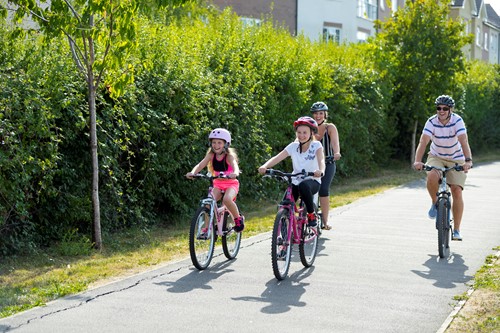
We have also created 22km (2019:19km) of new cycling routes in and beyond our developments in the year; enabling our customers and local communities to reduce their car use and also to avoid using public transport during the COVD-19 pandemic. For example, at our development at Cheswick Village, near Bristol we provided new cycle paths which provide strategic connections to local employment, education, shops and community facilities as well as providing for leisure and exercise. Being able to safely and easily cycle to these places can also help to reduce our customer’s carbon emissions. We also incorporate ‘trim trails’ through the green spaces on some of our developments, such as the one at our Ebbsfleet Green development; and at our Colindale Gardens development, North London, we have installed an outdoor gym for residents to enjoy.
The vast majority of our developments have green travel plans, and a range of initiatives are in place to help reduce car dependency, including cycle-ways, car clubs and other initiatives.
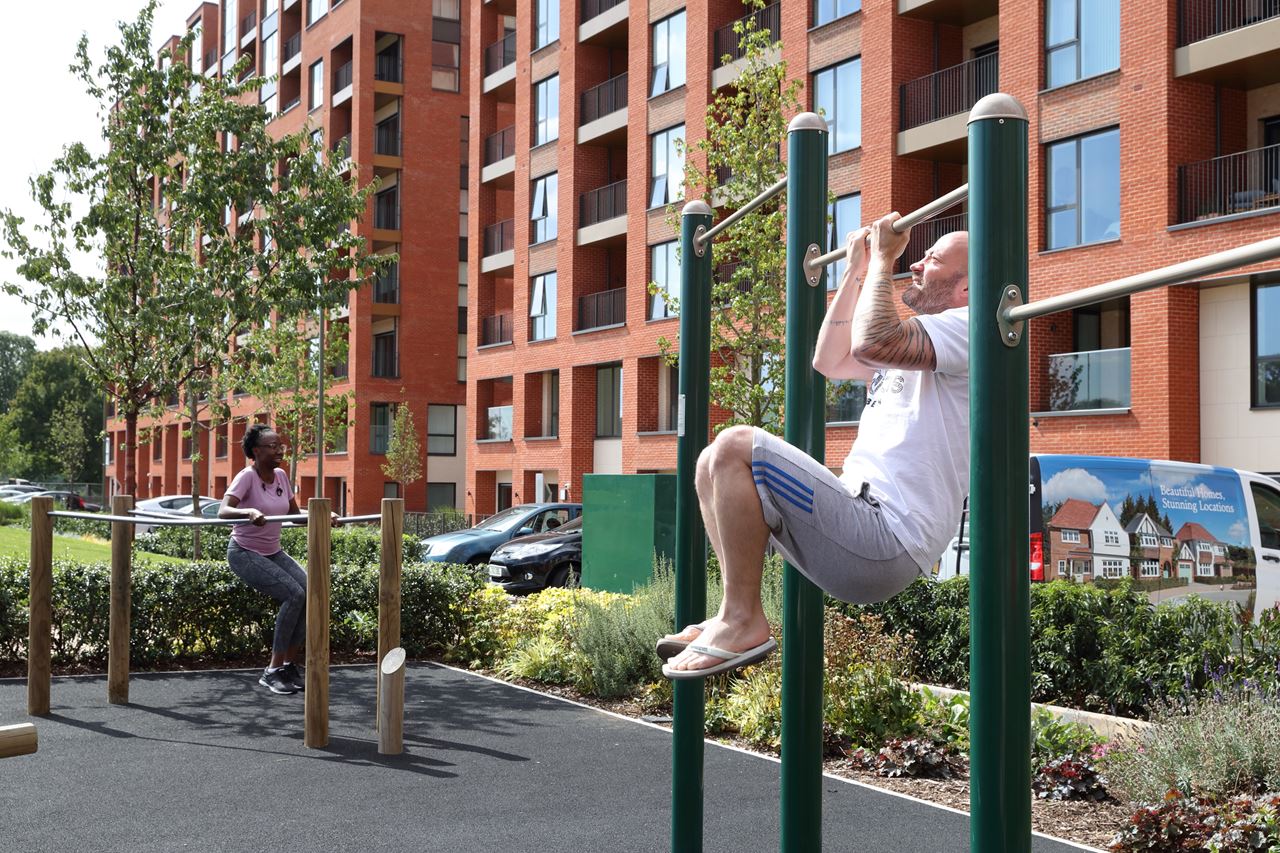
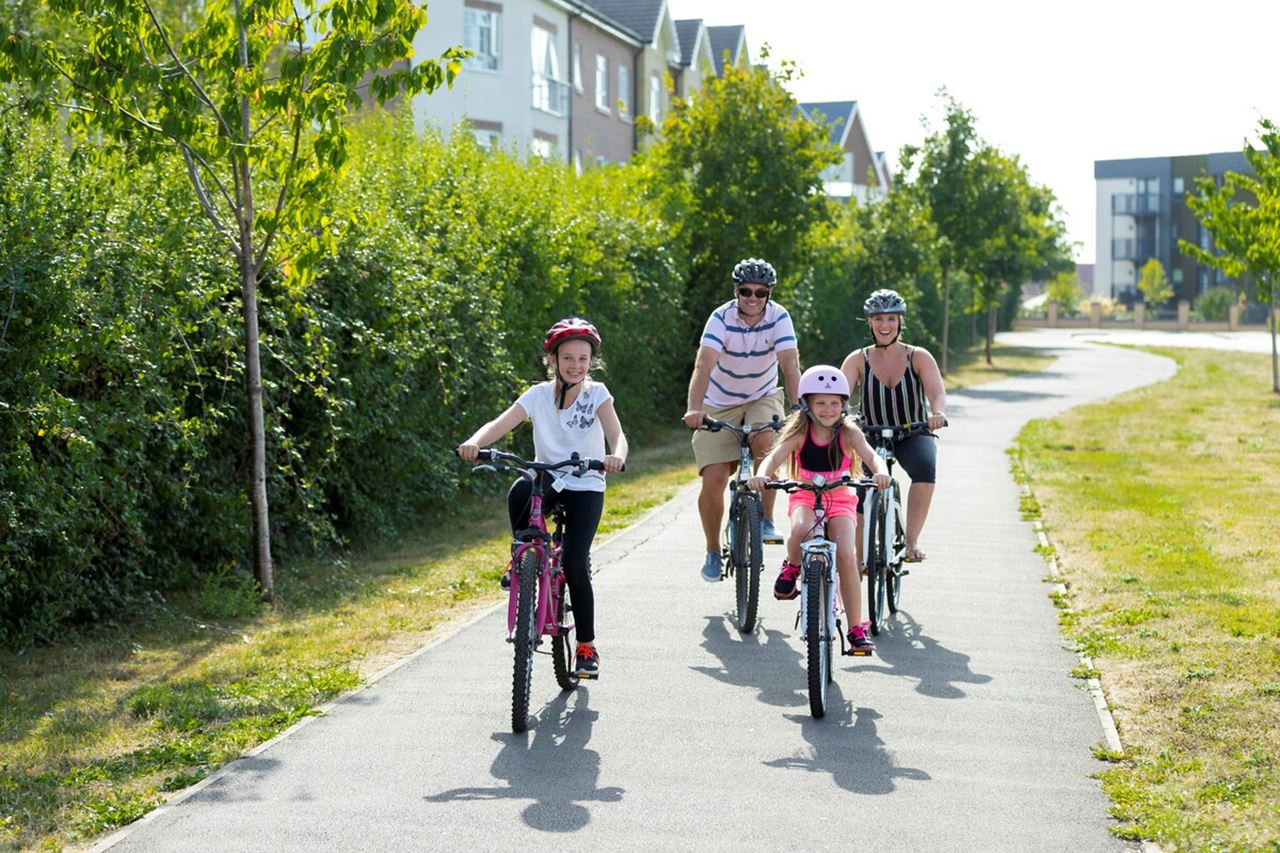
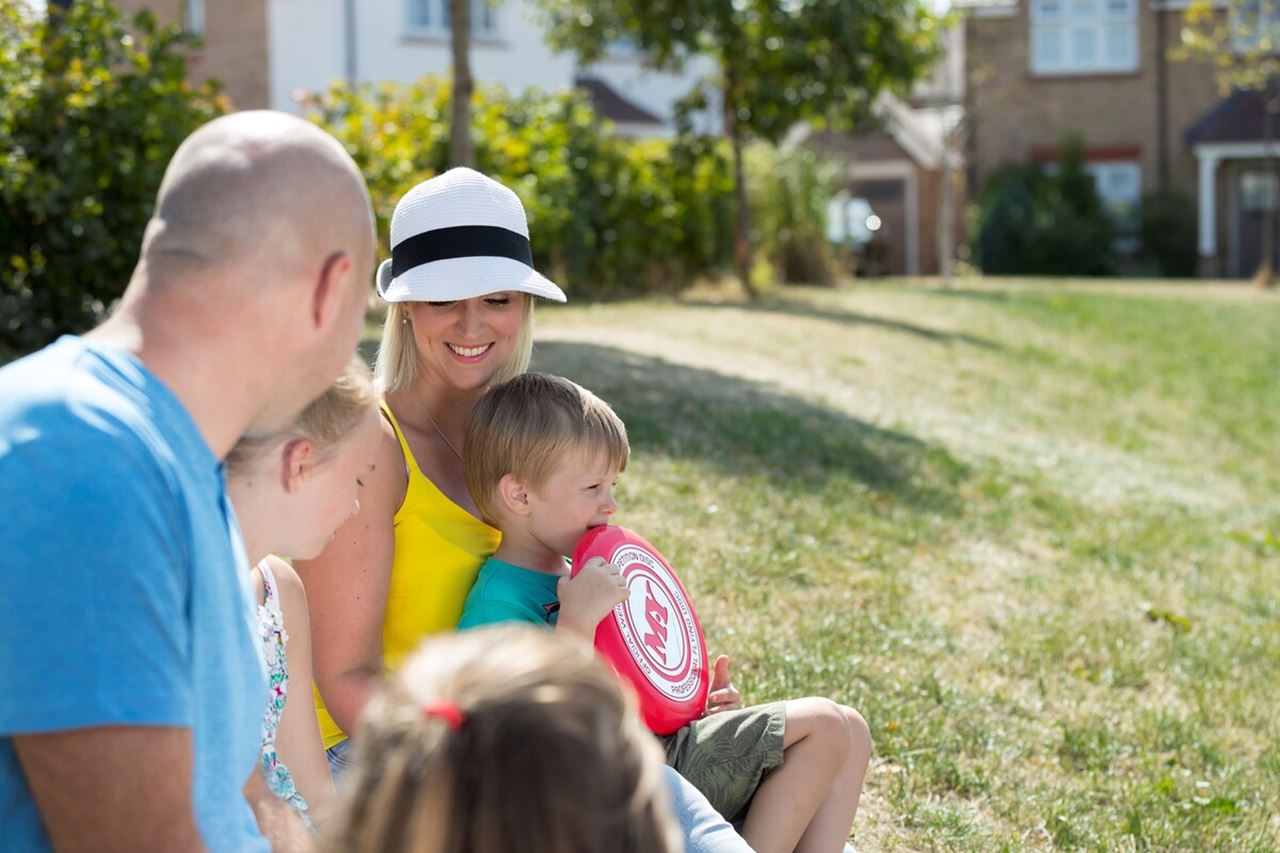
Bringing Benefits To The Wider Local Communities
For more than 40 years we have sought to create truly thriving communities which enhance existing communities, designing our developments in a way that helps people live sociable, active lives in attractive environments. This year we continued that approach, committing £188m to the local communities where we build for the development of new schools, local shops, community & health centres as well as green spaces as part of the planning process.
As part of our placemaking principles, we are committed to providing 'Homes for All'. We recognise that sustainable and socially cohesive communities are formed where there is a diverse mix of homes and tenures provided. We are proud to have designed, built and delivered 944 new affordable homes across our developments in the financial year (2019: 1,712) partnering with Registered Providers (RPs). Redrow is committed to providing high quality affordable homes for local people and one measure of our success in achieving this is the repeat business we continue to enjoy with both small and large RPs time and time again.
This year we completed a new community centre at our Caddington Woods development, Luton, and handed it over to the Caddington & Slip End Community Trust (CaSE) who will now manage it. The community centre, which is a zero carbon building, provides a focal point for everyone to come together to enjoy a range of activities including fitness classes, parties, local club meets and it also has an adjoining children’s play area. To help celebrate the opening of the new centre, members of Redrow’s sustainability team worked with local school children to create individual ceramic tiles to decorate the entrance area. Each tile depicted aspects of the natural world, celebrating the surrounding woodland, which is being enhanced to provide improved habitat for wildlife and a lovely natural space for the community to enjoy.
We know that since the COVID-19 pandemic, having access to a local shop has become more important than ever. At our Horsforth Vale development, a new independent local shop is situated at the heart of the neighbourhood, providing fresh provisions within walking distance for everyone in the new 500-home community.
We are also focused on creating ‘edible landscapes’ on our developments, providing food for both the local community and wildlife. Our community orchard at Saxon Brook, Exeter also provides beautiful blossoms – great for pollinators too – and a focal point for the community to come together to enjoy the harvest. At Cherhill View, Calne a strong allotment community has developed, coming together to grow their own fresh fruit and vegetables.
We are keen to help build a sense of community at our new developments, so we invite all new customers to welcome parties before they move into their new home. These informal events are an opportunity for everyone to meet their new neighbours and find out more about the new community and surrounding area. We also hold community days at many of our developments to help bring people together; for example at The Copse in Dawlish we arranged a Pancake Day event where the whole community – old and new – were invited to drop in to enjoy making and sampling pancakes together in the company of special guest bakers Louise and Val from The Great British Bake-Off.
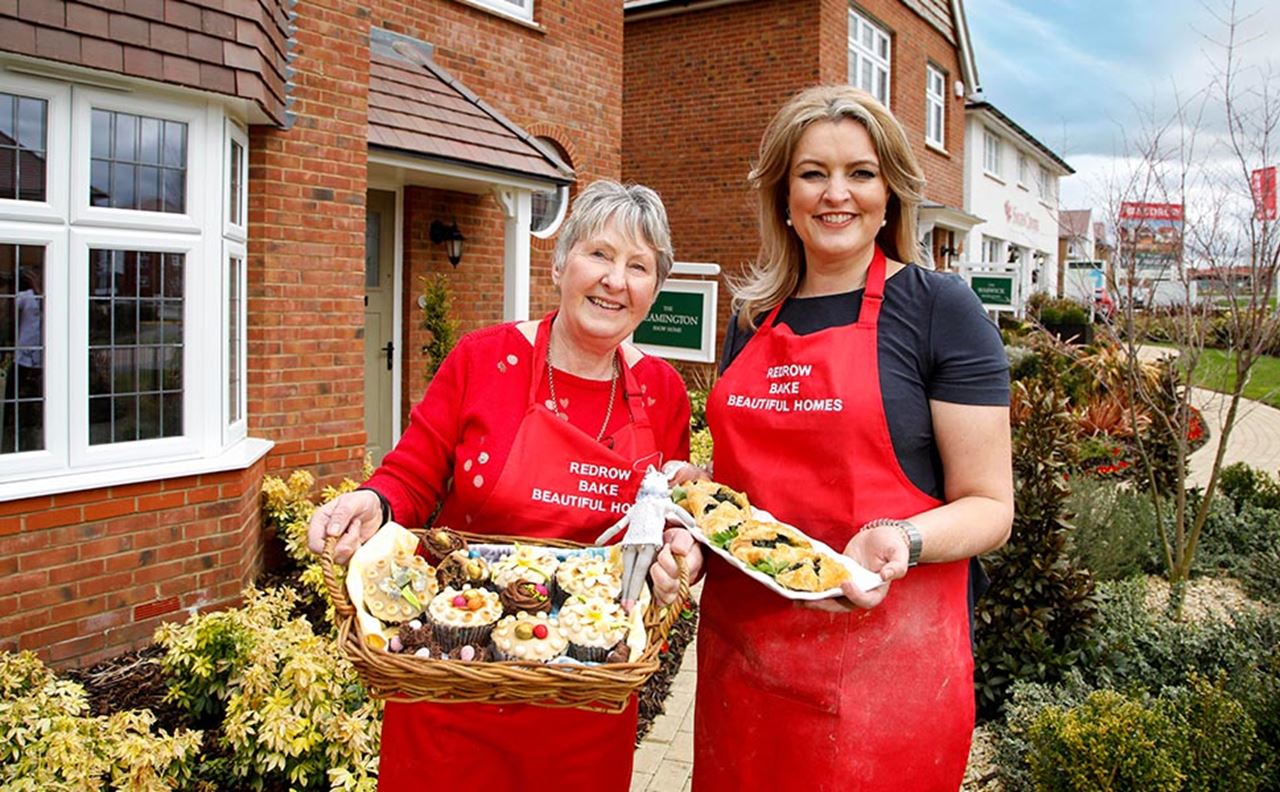

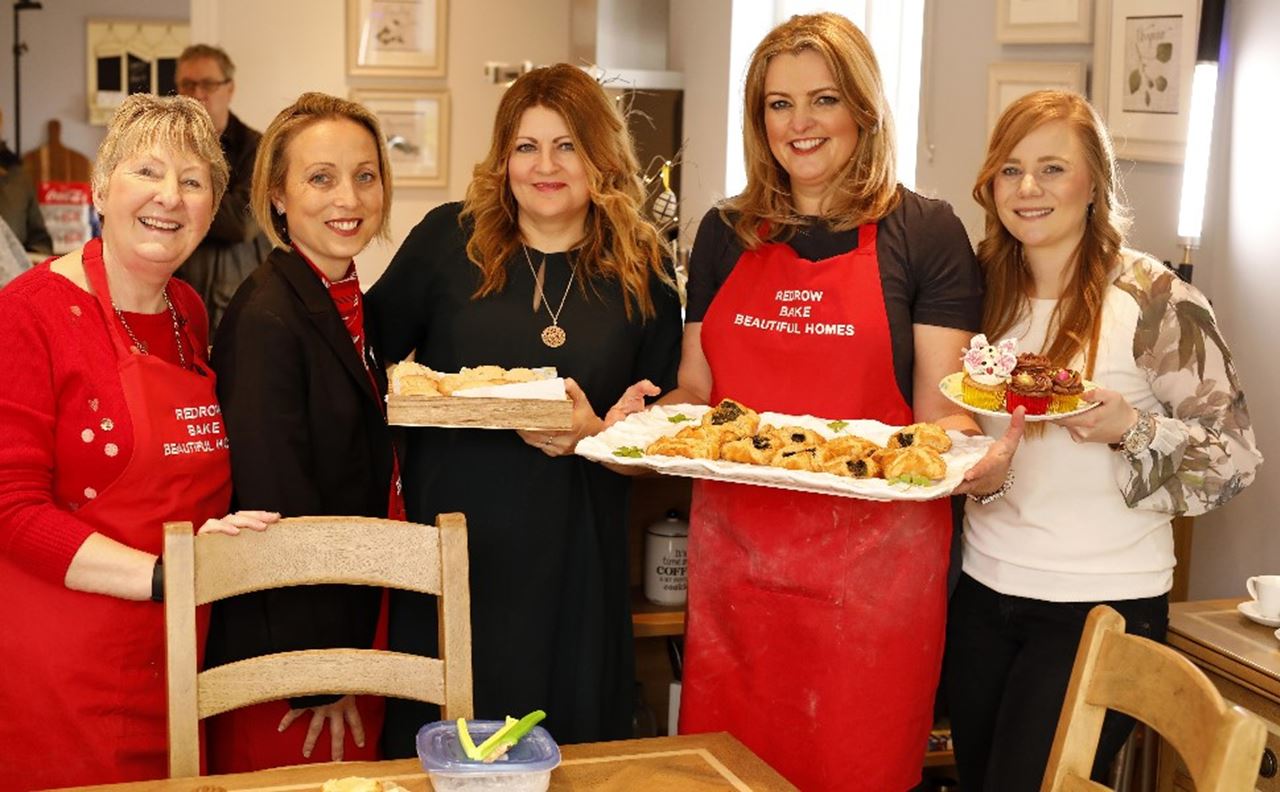
Year-on-year we continue to support community initiatives in the areas local to where we build. Our Local Community Funds are open for community groups to apply to. We have supported a diverse range of causes including, providing tools for a primary school eco-club in Formby, providing a much-needed mobility scooter for the 19th Swindon Scout group, enabling the purchase of new sound equipment at a performing arts school in Chester, supporting a project that aims to alleviate period poverty among local girls in Lancashire, sponsoring a carol service in aid of the Stroke Association in Marlborough, and providing kit for a new netball team in Cheshire. Across Yorkshire we have been rehoming lifesaving defibrillators from our completed construction sites to local communities. Harewood Nursery School in Pontefract, West Yorkshire, is the latest recipient, with the defibrillator being installed outside the school building, so the whole community has access to the device.
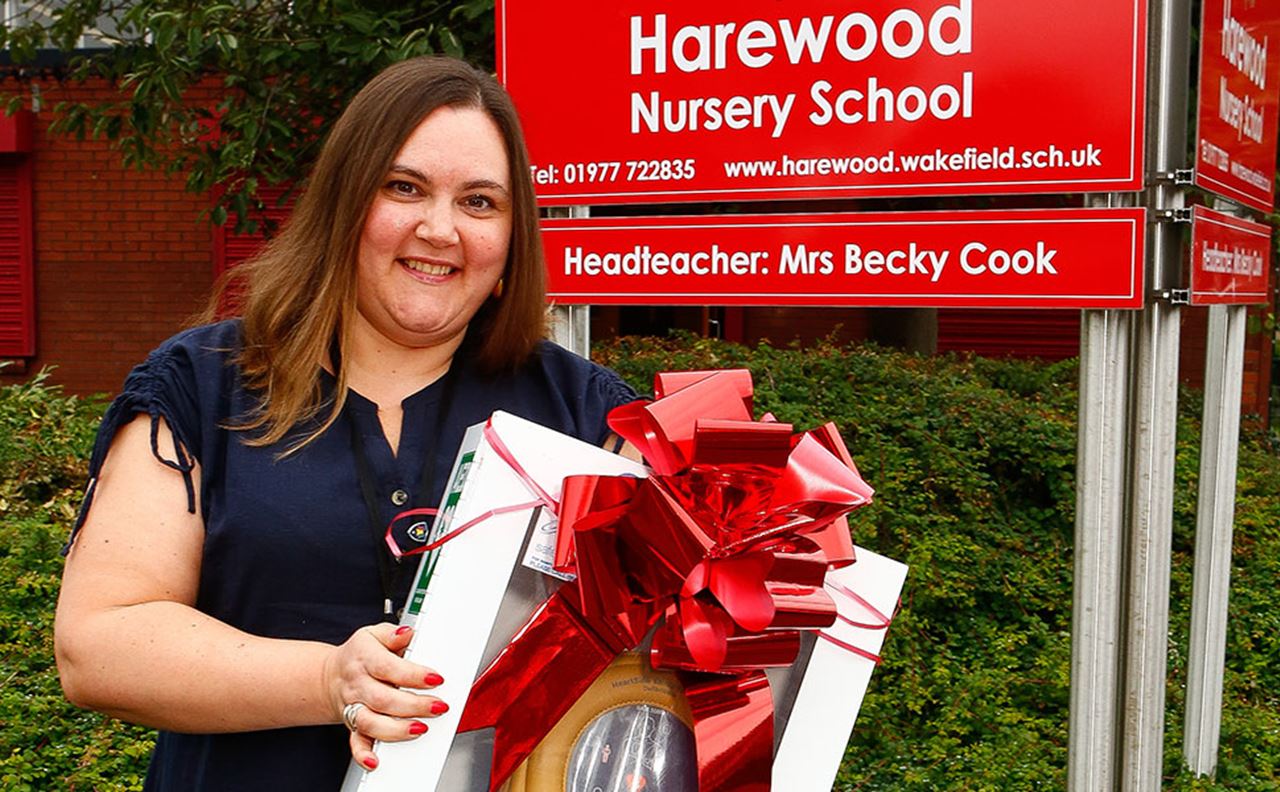

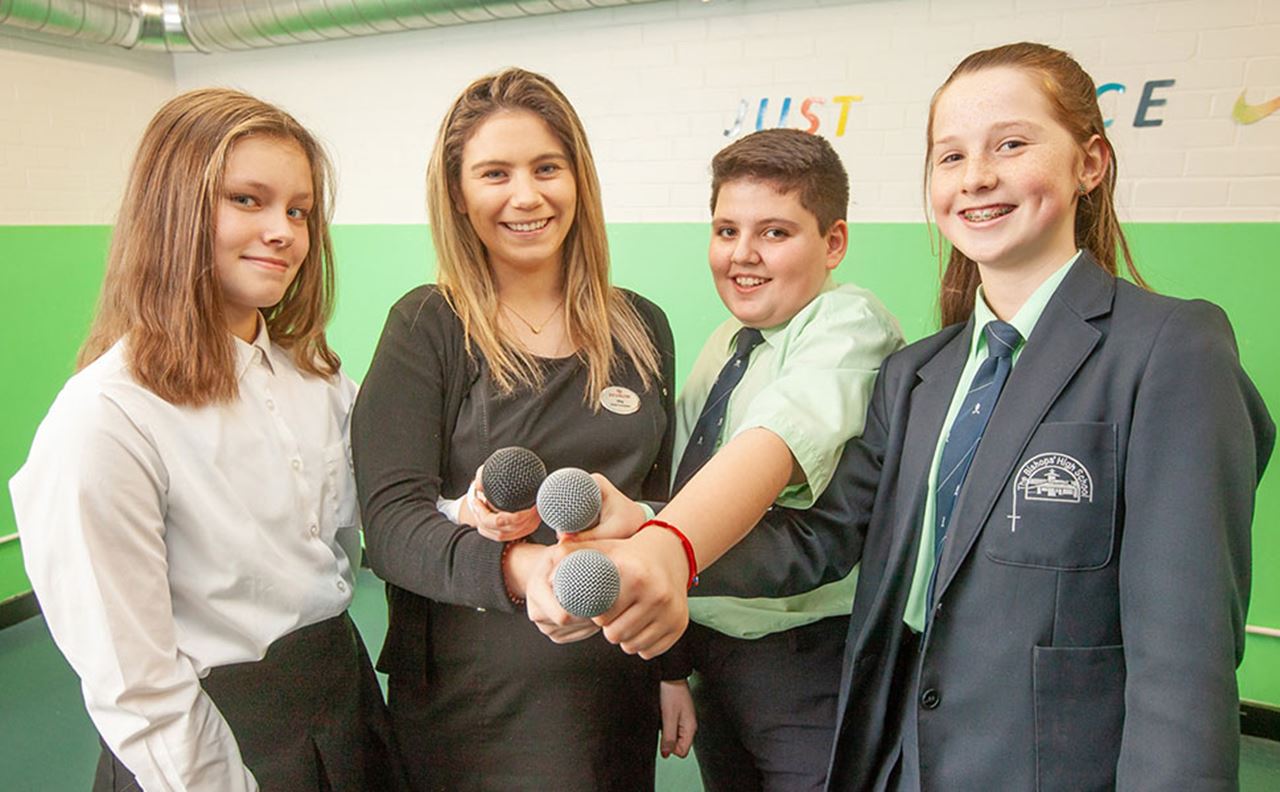
We continue to improve our systems and efficiencies, working closely with our suppliers and subcontractors to deliver increasing numbers of our quality homes.
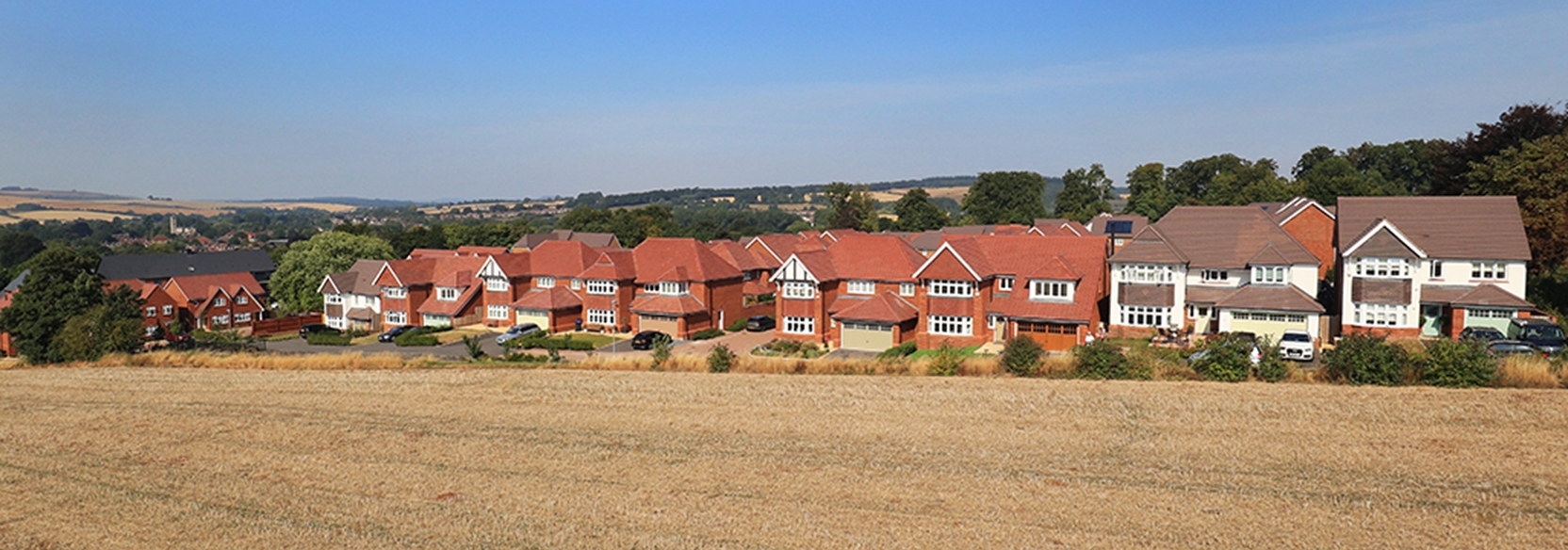
Corporate Responsibility
As outlined in our Chairman’s statement, our strategy includes a continuing emphasis on quality, service, addressing climate change and improving biodiversity –putting customers and the environment at the heart of our strategy.
We have been named as winner of the prestigious 'Global Good Company of the Year' in the Global Good Awards 2020 for our approach to social and environmental sustainability. We received the Silver Award.
Our shortlisting is based on our sustainable approach to development across three key areas:
- Building responsibly: e.g using 99.9% responsibly sourced and certified timber, minimising waste, reducing carbon emissions and partnering with organisations such as The Wildlife Trusts and The Bumblebee Conservation Trust;
- Valuing people: e.g through investment in apprenticeships, training and personal development together with comprehensive health and wellbeing programmes for staff and subcontractors;
- Creating thriving communities: e.g through a combination of strong placemaking principles and investment in local neighbourhoods.
At the start of the financial year we were also awarded the NextGeneration Innovation Award for our research into social value and our new social value calculator. In the NextGeneration annual benchmark we retained third place and received a Gold Award for the fourth consecutive year, which recognises our sustainability strategy, management and progress.
In order to continue to evolve and improve our approach, this year we commissioned an external organisation to undertake a review of our approach to sustainability and in particular how we can better communicate this transparently and effectively to our stakeholders. As a result we are currently undertaking a refresh of our approach which will include: re-engaging with stakeholders to undertake a new materiality exercise; which, along with a review of risks and opportunities, may result in a re-alignment of our vision for sustainability and our aspirations and goals in this area.
Revenue, Legal Completions and Outlets
The Group’s results were significantly impacted by COVID -19 in a financial year that was budgeted to be disproportionately weighted towards the final quarter. As a consequence, we achieved 93% of our legal completions in the 39 weeks to the end of March 2020 (2019: 64%). This resulted in revenue for this financial year being 37% below last year at £1,339m (2019: £2,112m) and legal completions falling to 4,032 (2019: 6,443).
Our established award winning Heritage Collection contributed 84% of the Group’s private sales revenue (2019: 79%) with our bespoke product representing 16% of private sales revenue (2019: 21%).
Affordable housing accounted for 23% of legal completion volumes this year compared to the unusually high 27% in the previous year and 10% of homes revenue (2019: 12%).
Homes revenue by geographical area was broadly in line with the previous year with 38% in the South, 26% in Central, 23% in the North and 13% in Greater London.
The temporary closure of all our sales centres impacted our active outlets this year where our average fell from 126 last year to 110 this year. At the end of June 2020 we were operating from 113 active outlets (2019: 129).
Valuing and Developing People and Partners
Health and wellbeing
This is one of our strategic aims. Health and wellbeing is an important part of this and never more so than these challenging times both in terms of physical and mental health.
We have a dedicated wellbeing advisor supported by wellbeing champions in all our divisions together with a dedicated health and wellbeing page on our intranet. This year we also launched a health and wellbeing newsletter to focus on a range of topics and share different ways employees can improve their physical and mental wellbeing.
Mindful of the importance of work life balance, during the year we reviewed our working hours and reduced these whilst still offering flexibility within working hours. In our 2020 Insight employee survey, conducted for us by an external consultancy, we achieved a 91% response rate and 76% of respondents were happy with their home/work life balance, up from 67% in the previous year.
Having launched our “Mind Your Head” initiative last year, we have built on this in the current year and now have over 200 mental health first aiders across the Group. A mandatory online mental health e-learning module has been launched for all Redrow colleagues to gain a better understanding of mental health and support to take care of their own wellbeing as well as that of others. A bespoke Redrow Directors course focused on leadership responsibilities around mental health has been designed and commenced roll out across our divisions pre COVID-19 together with training for managers.

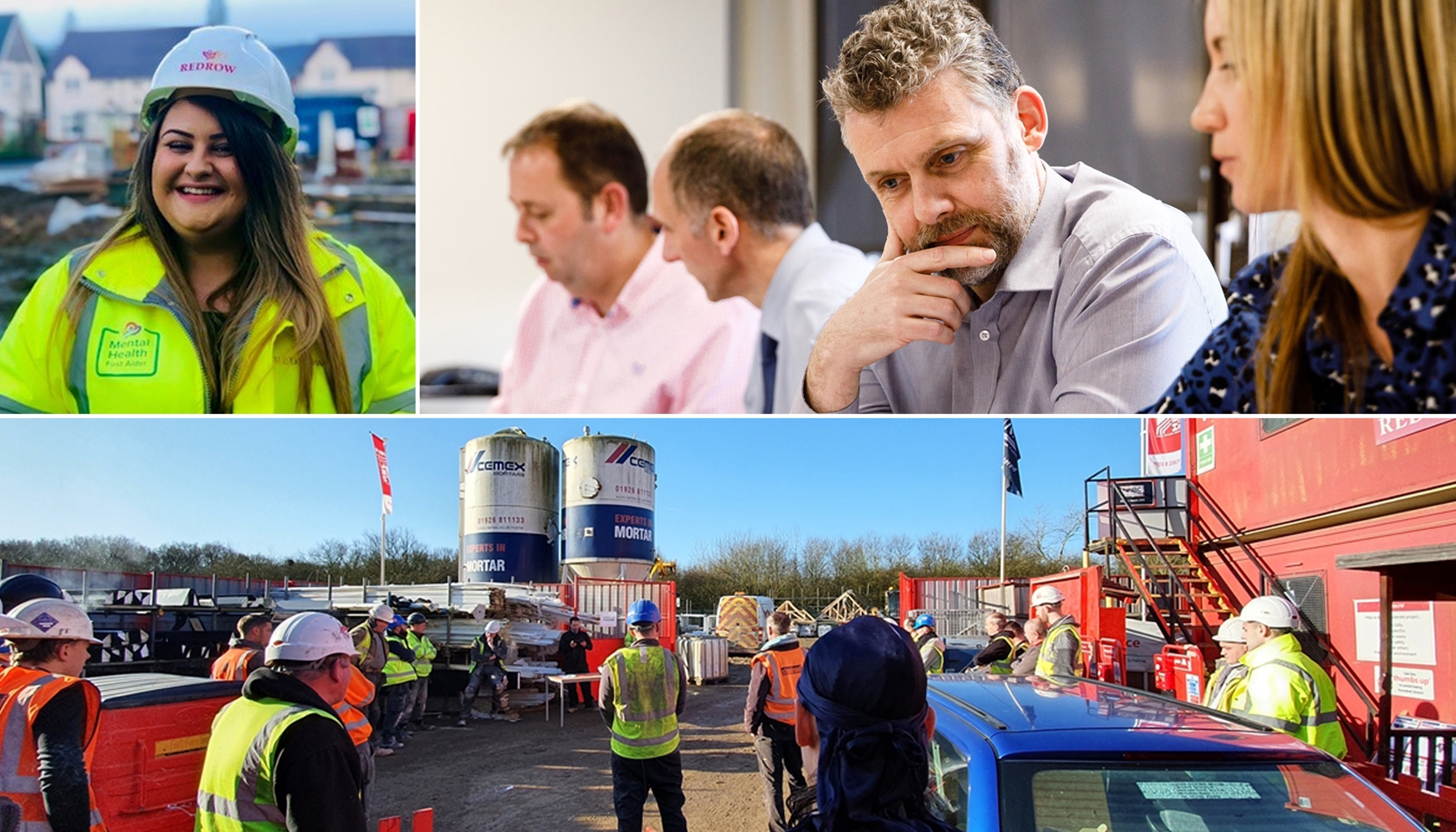
A suite of mental health toolbox talk sessions have been created for our site teams. Each session provides education round key mental health topics and focuses on the support available. We supported “Time to Talk” day on February 6th when our sites hosted these talks and encouraged all colleagues and subcontractors across our business to step away from work and talk, over lunch, cakes and biscuits.
A variety of other initiatives have also been delivered including flu jabs offered to all Redrow colleagues and support for financial wellbeing.
Learning and development
A key focus has been developing, communicating and training on new safe working practices in the light of the COVID-19 risk. During lockdown and subsequently we have placed additional emphasis on our e-learning platform, ensuring all colleagues completed vital working training and allowing core skills to be refreshed.
In total, we completed 5,925 training days this year, including those which support our induction process from a combination of e-learning and face to face training delivered at our training centres at Tamworth and Daresbury and training suite at our Head Office. 14% of our employees are trainees (2019: 15%).
We continue to support work to inspire the next generation into careers in construction. For example, we have supported three Skill Build events this year in South Wales the South West and the National finals and continue to work with Wolverhampton UTC by providing assistance with employer projects, CV workshops and careers events. We have also revalidated our association with John Moores University this year and currently have three Redrow colleagues studying the Construction Management in Housing Building degree we helped to develop.
Redrow also has Redrow’s Women’s Network which is a group developed to support women in the business and young females entering the industry providing mentoring.
Partnering for Supply Chain Sustainability
While the work we do in reducing the direct impacts from our operations is important; the greater part of our impact comes from the products, materials and activities of our supply chain. This is why we continued to develop our partnership with the Supply Chain Sustainability School during the year, to help build awareness and the skill-base of our supply chain across a range of sustainability issues. It’s also a more efficient process for the supply chain, since accessing the School’s resources prevents the need to repeat the process for other customers as it’s visible to all.
We are members of the School’s Carbon Special Interest group, working with our industry peers to drive a reduction in carbon emissions from the supply chain through products, works and services procured. Phase one of the project is already underway and involves the collection of Scope 1 and Scope 2 energy and carbon data from key suppliers into a bespoke online tool; with a view to collecting Scope 3 data at a later date and for the most carbon-intensive materials only. The collection of this data will help us in calculating the greenhouse gas emissions from our supply chain that are attributable to us, as our Scope 3 emissions. The second phase of the project with be engaging further with the suppliers to provide resources to help them reduce these emissions.
We have continued our work liaising with our supply chain to find ways to eliminate, reduce, reuse or recover packaging. This includes the Dulux paint can recycling scheme, which sees used, empty paint-cans recycled into new materials and products, such as plastic piping or steel tools. More than 17,000 paint-cans were recovered from our sites this year which contributes to our excellent track-record in diverting waste from landfill. In addition, our pallet repatriation scheme recovered in excess of 34,000 pallets in the year by our supply partner. A new approach that will enable the recovery, repair and re-introduction of dedicated pallets for construction products is to be trialled later in 2020.
Understanding the origins and potential impacts of the products and materials we use has long been an important issue for us. We use a large amount of timber in the construction of our new homes and we are aware that illegal logging is one of the most serious threats to the world’s forests, which are home to many threatened wildlife species as well as vulnerable communities. They are also important in their capacity to store carbon. Consequently we have been working to ensure the timber we buy is from known and responsible sources. We were active members of WWF’s Global Forest Trade Network from 2003, until the group was recently closed by WWF. Despite the closure of the programme, we continue to progress and implement the policies and practices developed over this time, and remain dedicated to sourcing forest products from well-managed sources. In the 2019 calendar year, 99.9% of the forest products in our homes were from verified and credibly certified sources, as follows:
- 81.32% credibly certified (e.g. FSC purchased with Chain of Custody)
- 18.58% source verified (including e.g. PEFC purchased with Chain of Custody)
We have recently disclosed to the CDP Forests Programme for the first time in order to maintain transparency in our reporting this area and to continue to develop as industry leader in this field.
For other materials and products used in the construction of our homes, we use a supply chain mapping system to enable us to better understand their origins, enabling us to work with supply partners to identify and avoid those products deemed to be high risk in respect of environmental and social ethics. During the year we have reviewed the percentage of recycled content of our materials and will now start exploring alternatives to help increase the recycled content in our homes and reduce our embodied carbon emissions. Our internal product review panel seeks out and appraises potential new products and materials that will help us continue to improve the efficiency and sustainability of our homes. During the year we introduced new feature gable panels and feature cills which are manufactured off-site helping us reduce waste, limiting the need for people to work at height, increasing build efficiency, as well as offering a consistent and quality finish.
Datum RPO were introduced in 2019 to manage the supply of agency labour and to ensure we have a legally compliant workforce from a preventing modern slavery perspective. Regular audits have been undertaken of the labour supply chain to prevent non-compliance have been undertaken by them throughout the year.
Improving Our Systems and Processes
It remains fundamental as our business continues to evolve and face new challenges and opportunities that we continue to invest in improving our systems and processes to support this.
We have a dedicated team of in-house IT specialists including a digital team, system analysts, software developers, IT security officers, help desk experts and systems accountants led by our Chief Information Officer. The team work closely with Group and the operational businesses with major system improvement projects sponsored by members of the Executive Management team.
Our systems have proved resilient during lockdown and the in-house IT team adapted quickly to allow the majority of Head Office and divisional office staff to work from home. We and our customers also benefited from the online reservation system we introduced last year and have now introduced video call functionality to MyRedrow as a further option for our customers to interact remotely with our sales colleagues.
Our “REDSMI” Site Managers Inspection iPad application is now fully embedded within our construction teams. They now have the ability to carry out 9 quality inspections of each property throughout the entire construction process – noting good practice and items that need rectifying, with pictures and text. The reports and photographs from these inspections are sent directly to our subcontractors, resulting in quicker resolution of defects and a higher quality finished product.
Along with many other businesses we have embraced personal conferencing facilities. These have quickly become embedded as an efficient and socially distanced way to hold meetings which will continue to be used going forward.
To meet the demand for new homes, the housebuilding industry must work with Government and the wider community to inspire the next generation to build.
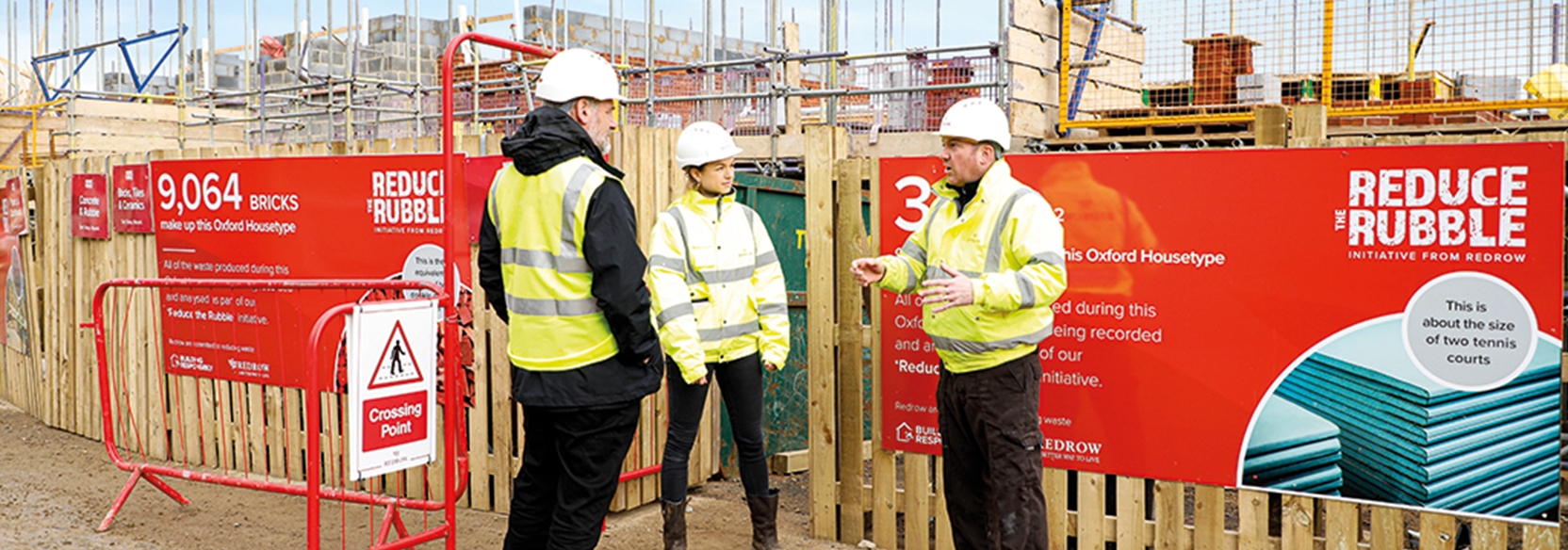
Building Responsibly
Considerate Constructors
A key element of building responsibly is ensuring that our construction sites are managed in a way that seeks to improve the image of construction by striving to promote and achieve best practice in the following areas; caring about appearance; respecting the community; protecting the environment; securing everyone’s safety; valuing the workforce.
As a contractor partner of the Considerate Constructors Scheme (CCS), we have committed to signing-up all our developments to the scheme. This means that regular visits are undertaken by a monitor from the CCS to determine if our sites are meeting the Scheme’s Code of Considerate Practice.
In 2020 two of our sites won national CCS site awards; Springfields in our Yorkshire division and Padcroft Works in our London division. These two sites will be represented at the national awards ceremony, amongst their selected outstanding performing peers, where the level of their award will be determined.
During the year we had a total of 94 monitoring visits across all of our divisions with an average score of 35.09 (out of a possible 50), which is consistent with the previous year’s results.
May 2020 saw the publication of an internal document called “Considerate Constructors Scheme (CCS) Guidance”. The aim of this document is to provide all of our construction colleagues with a fully comprehensive guide of the CCS scheme along with a Redrow specific checklist so that the message is consistent throughout the business and leads to continued improvement.
The last four months of the financial year have seen a fall in the number of visits carried out by the CCS due to the COVID-19 pandemic but the visits are now resuming, albeit these are largely on a virtual basis via personal conferencing facilities. We are committed to working with the CCS to find ways to carry out visits in line with current restrictions and are keen to show the monitors what measures we have implemented to keep our workforce, customers and stakeholders safe. These measures include, but are not exclusive to:
- Every site having a dedicated COVID-19 supervisor to manage all matters relating to COVID-19;
- Introducing hand cleaning stations in the welfare facilities and out on site;
- Ensuring that the 2m social distancing guidance can be adhered to in the welfare facilities by introducing floor markings, rules and additional outside seating;
- Ensuring that the 2m social distancing guidance can be adhered to out on site by way of floor markings and restricting the number of operatives in each plot; and
- Introducing a whistle blowing text number so that anyone with concerns can contact us.
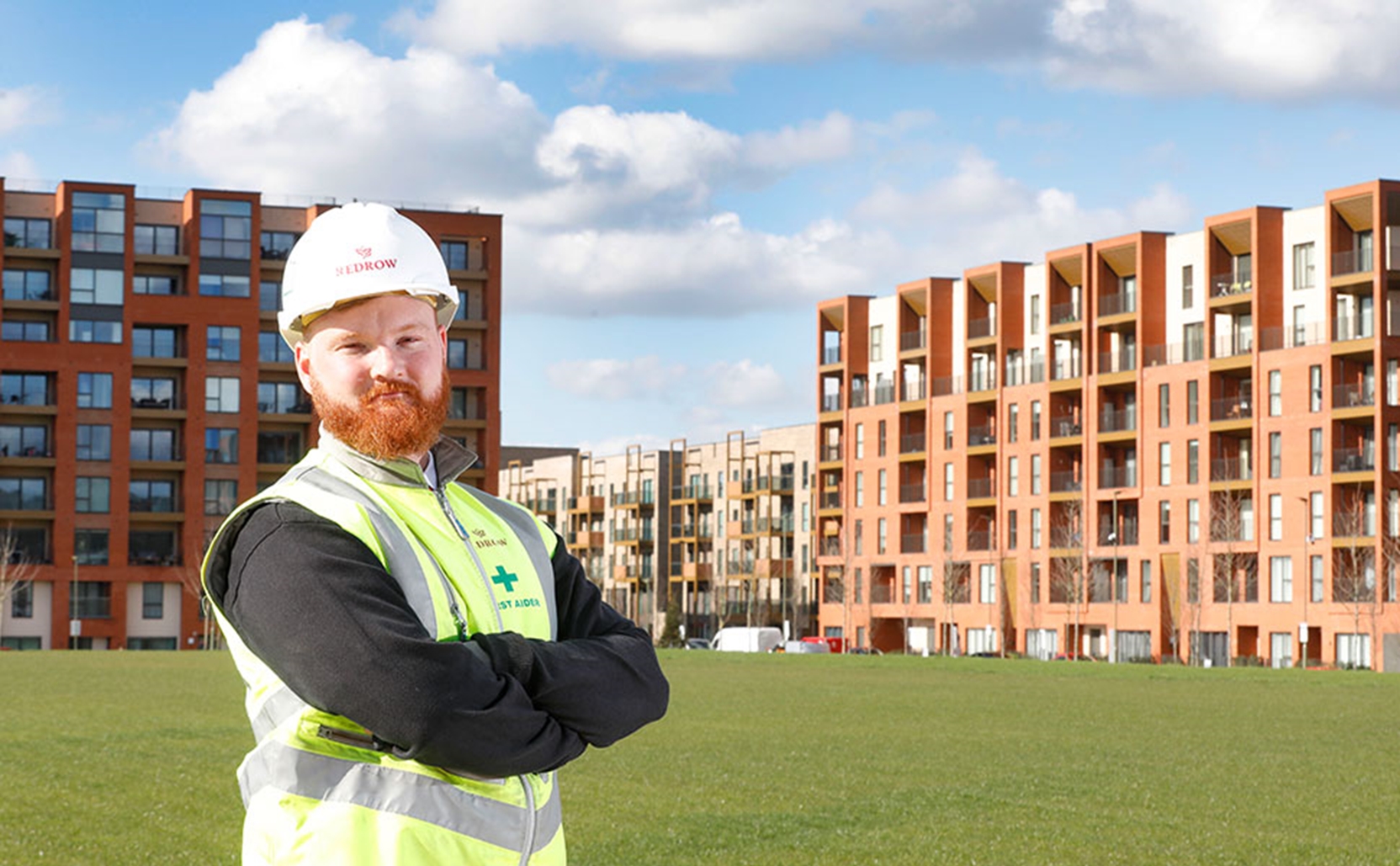
Michael Hollington, 28, works as an assistant site manager at Redrow’s Greater London division and is currently midway through his second year of our Housebuilding Degree programme. Launched by us in partnership with Liverpool John Moores University (LIMU) and Coleg Cambria, the degree is the first of its kind and aims to equip participants with the vital skills needed to become a construction manager, over three years.
Michael has been employed with us for four years and is currently based at the housebuilder’s flagship North West London development, Colindale Gardens. Upon completing his A-Levels, Michael took up a place at a University but unfortunately had to withdraw due to personal reasons after just five months. Michael thought his further education journey was over until his boss approached him with the opportunity to join our degree programme.
The three-year degree is open to both current employees with a level three qualification or a minimum of five years in the industry, as well as school leavers with three A-level pass grades of a BTEC Level 3. The degree provides candidates with a full overview of housebuilding skills, including housebuilding quality, project management, health and safety, business skills and negotiation, as well as relevant aspects of law, mathematics and economics.
In each year there are six block weeks of classroom learning which will be taught in partnership between LJMU’s Department of the Built Environment, Coleg Cambria and our business experts with the rest of the contact time satisfied through classroom learning, practical site visits and tutorials. Candidates will be assessed in a variety of ways including presentations, examinations, coursework and a final year dissertation project.
Now, Michael balances his time between training at college and his role with us. He said: “Not only has the degree programme motivated me to prioritise my self-development, but it has also been excellent in equipping me with the skills I need to further develop my career in the industry. Due to the way the course is structured, I’ve had the opportunity to experience jobs in other disciplines first-hand, such as customer service and land technicians. Recently I was given training in 3D modelling using a VR headset which has given me a better understanding of building design and is already hugely benefiting me in my day to day role.”
Michael joined us after a stint at a smaller competitor. On his time with us, he said: “I joined Redrow due to its excellent reputation for high-quality homes, and the emphasis they place on employee wellbeing. I work in a team of 20 people who motivate one another to deliver the best.”
NHBC Construction Quality Review (CQR)
During the financial year, the NHBC undertook 110 CQRs (2019: 136) across our developments. Each build stage is scored from 0-6 with over three quarters of our build stages rated above good to outstanding.
The NHBC also carry out inspections at key build stages in their warranty provider capacity, reporting any defects that fall below their standards of quality. Average reportable items per inspection are monitored.
The table below shows average reportable items and CQR percentage and average scores.
| Quality | FY 2020 | FY 2019 |
| Average reportable items per inspection | 0.20 | 0.20 |
| Construction Quality Review - % | 80.3% | 75.1% |
| Construction Quality Review - average score out of 6 | 4.13 | 3.97 |
Average reportable items at 0.2 per inspection in 2020 remained consistent with the prior year and places us in the top quartile of our peer group. We are targeting a reduction to 0.15 by focusing even more on quality throughout the build process, aided by the integration of our quality based inspection application RedSMI.
The CQR score for the year was 80.3% an increase from last years 75.1%.
NHBC Pride in the Job Awards
2020 sees the 40th anniversary of the NHBC Pride in the Job Awards, recognising excellence in on-site management.
From 11,000 eligible site managers nationwide, only 240 have been awarded a first round quality award with 21 of those being Redrow site managers.
These 21 award winners will be presented with their awards at virtual ceremonies later this year and will continue on to the next stages of the competition, trying to secure a seal of excellence, regional or national award.
Last autumn, 8 of Redrow’s 2019 first round winners went on to achieve the coveted seal of excellence awards.
Product Design
As well as offering spacious, adaptable living spaces for both work and relaxation, our homes also offer excellent levels of energy efficiency. This provides comfort and financial benefits for our customers whilst simultaneously helping to tackle climate change by reducing emissions. Our approach focuses on delivering an efficient building which retains heat due to high specification materials, superior insulation throughout, state-of-the-art air-tight windows and doors and energy efficient boilers and appliances throughout. We supplement this approach with the addition of renewable technologies, where appropriate and take great care in helping our customers understand how these features work so they can reduce their bills and play their part in reducing their carbon emissions.
Furthermore, we are committed to extending our existing approach in order to deliver zero-carbon homes in the coming decade, playing our part in the UK’s transition to a zero-carbon economy by 2050. Our first steps on this journey have taken place this year, as we began scrutinising several low-carbon technologies for room and water heating in our homes, including air source heat pumps and infrared panel heaters. We are currently trialling a smart home and energy management system which has the following features and potential benefits:
- Intelligent light switches that can reduce the total energy consumption of a home by up to 20% through observing and learning the occupant’s life styles and adapting the heating and lighting to avoid wasting energy on empty homes or unused parts of the house.
- Energy management system comprising solar PV panels, battery storage and an intelligent hybrid inverter that looks to achieve net-zero electricity use in the home.
- Using battery storage, the system automatically and invisibly ‘time shifts’ consumption to use the generated renewable energy when it is most needed. In winter, it automatically tops up the battery with low-cost off-peak energy; in summer, the excess of renewable energy is sold back to the grid for the best price.
Our homes also have one of the lowest water use standards in the industry at 105 litres-per-person-per-day (lpppd), compared with a building regulation standard of 125 lpppd. This is an issue of increasing importance; a recent report from the Public Accounts Committee shows that England is likely to face significant water shortages within the next two decades as the population grows, urbanisation continues and the climate warms. We continue to be active Gold Leaf members of the UK Green Building Council, working with them to deliver our shared vision of homes and developments that enable people and the planet to thrive.
Managing Our Resources Efficiently and Reducing Our Carbon Impact
Carbon Reductions
During the year we partnered with a new specialist energy management company to improve our commercial efficiency and assist with the timely collection of energy data from our site operations. Our independently verified greenhouse gas emissions increased to 3.01 tonnes of CO2e per 100m2 of build (2019: 2.42 tCO2e/100m2); more information on this data can be found on page 104. The increase is attributable to improved site gas and electricity data collection combined with a reduction in homes built in 2020 due to COVID-19. Emissions from site diesel reduced by 11%, from site LPG by 50%, from office gas use by 12%, from business travel by 20% and from office electricity by 5%. Some of these reductions are affected by operational changes due to COVID-19. Emissions from air conditioning units have increased slightly due to more offices being heated and cooled by such systems.
Almost 50% of our direct greenhouse gas emissions come from use of diesel on our sites and consequently we have been working to reduce this during the year. We are currently trialling a hybrid generator system with solar PV and a smart energy management system and will be looking to roll this out across all our construction sites following further testing. Indications to-date show that a fuel saving of between 33% and 50% can be achieved using this technology, with the accompanying emission reductions, and they have an added bonus of noise reduction due to the reduced time the generator needs to operate. We are also currently investigating the efficacy of Hydrotreated Vegetable Oil (HVO) with our supply partners, as an alternative fuel for site plant and equipment which we anticipate would reduce net CO2 emissions by up to 90%.
We have also been working to reduce site and office gas and electricity consumption. Eco-cabins are now being rolled-out to all new sites, providing: improved thermal insulation, double glazed windows with low u values, energy efficient LED lights with PIR activation, energy efficient heaters with thermal cut out and timers and energy efficient point of use hot taps. Electric vehicles and hybrids are included on the company car list for all car grades and all of our regional offices have charging points installed. We are now installing charging points in all new sales centres for use by site-based staff and customers. Investing in this infrastructure will encourage and accommodate changing behaviours and further reduce our direct and indirect carbon emissions.
We continue to publically disclose to the Carbon Disclosure Project our energy and carbon data, along with details of our policies, strategy, management and progress against targets. In 2019 we were scored ‘B’ for our main disclosure, which is the same as the construction sector average and higher than the European regional average score. Our Supplier Engagement Rating was also scored ‘B’ which is higher than both the construction sector average and the European regional average scores. We are also one of only 28 companies listed on the UKGBCs new Climate Commitment Platform, outlining our climate commitments and helping promote further action and ambition across the built-environment sector. More information on our listing at the UKGBC Climate Change Platform is provided at https://ukgbcclimate.net/company/redrow-plc. During the year we also began a screening assessment of the emissions from our ‘indirect’ activities (Scope 3), including the manufacture and transport of materials and the use of our homes by our customers, with a view to greater disclosure of these issues in the future.
Reducing waste
We are now starting to see the results of our work over the last few years in eliminating and reducing waste from our construction activities. In 2020 waste generated has reduced to 8.97 tonnes per 100m2 of build (2019: 10.15 t/100m2).
During the year we launched our ‘Reduce the Rubble’ project which is systematically auditing all of the waste generated during construction of a ‘typical’ Redrow home, and working with site teams, designers, subcontractors and suppliers to identify the root causes of the waste to find ways to eliminate or reduce it in the future. In March, the teams involved in the project also attended Waste and Resource Efficiency workshops to help them understand the principles of resource efficiency and the circular economy, the legal framework, practical measures to reducing waste and the benefits that can be achieved. The workshops were delivered by an expert at our partners, the Supply Chain Sustainability School and we are looking to roll these sessions out for all divisions. An example of where we have identified waste reduction opportunities is in relation to plasterboard offcuts; and we are currently reviewing the lengths of plasterboard we procure with a view to reducing offcuts and waste. We continue to share best practice and findings from our work in this area with industry peers through our ongoing membership of the HBF Waste Forum and involvement in the Supply Chain School Waste Special Interest Group.
Although our main focus is on the eradication and reduction of waste in the first instance, we also continue to ensure that any waste that is created is reused or recycled as appropriate. During the year 97.4% of our waste was diverted from landfill, a very slight decrease from 97.7% in 2019 which may be attributable to restricted access to some recycling facilities during the COVID-19 pandemic; however we continue to exceed our own target of 95%. We reuse the vast majority of inert waste on our sites, with the appropriate licences and specifications. For example, at our Wendlescliffe development in Bishop Cleeve we crushed existing demolition waste to an approved specification and reused this crushed material under the private driveways. We also continue to support the Community Wood Recycling scheme – a social enterprise who provide a waste wood collection service from our sites. Throughout the year more than 600 tonnes of timber was collected from our sites by the scheme, which has all been recovered, providing jobs, training and opportunities for people who are otherwise marginalized from the labour market.
In addition to the industry-leading water standards designed into our homes, we are also focusing on reducing the amount of water used in our operations. We are currently working with a utility specialist company to help us better monitor and manage water use on sites and are installing waterless urinals in all new site welfare facilities.
We also incorporate Sustainable Urban Drainage schemes on the majority of our developments to improve rainwater management and reduce flood risk. At our Heathlands development in North Wales, we have been commended for effective water management, including rainwater harvesting which safely and cleanly diverts rainwater from the rooftops of the new homes and feeds it into the adjacent nature reserve, and having extensive long-term management plans in place.
Health & Safety
The all accident figure for the 2020 financial year decreased by 27.5% to 310 compared with 428 in the prior year. There was also a 7% decrease in the number of reportable injuries in 2020, down to 42 compared with 45 in 2019.
Unfortunately, due to the decrease in the average number of sites in the 2020 financial year compared to the prior year, from 126 to 110, this has resulted in a slight increase in our ‘accident per site rate’ to 0.38 compared with 0.36 in the previous year.
The above figures have to be read in context of the impact COVID-19 had on the country, the construction industry and the house building sector during the lockdown period. The reduction in the average number of sites in the year reflects the impact of the closure of sites during the majority of the lockdown period.
The last four months of our financial year has seen us work collaboratively to develop and publish our COVID-19 Secure Risk Assessments for all four key areas of the business, namely Offices, Sites, Sales and Customer Services. These documents have also been supplemented with additional internal operating guidance, ‘return-to-work’ e-learning packages, and instructional COVID-19 videos. All of these have contributed to ensuring that the health and wellbeing all of our employees, contractors and customers were and are sufficiently protected as our developments and offices returned.
Since returning to work we have instigated COVID-19 Compliance Inspections and continue to do so in order to ensure that we are effectively planning, managing, monitoring and co-ordinating our work activities.
Redrow remains committed to improving its overall Health, Safety & Environmental (HS&E) performance and has been continually reviewing its HS&E Management Systems by introducing over 25 system updates during the reporting period. In addition, Redrow’s environmental arrangements and systems are regularly assessed against the requirements of the international environmental management standard; ISO 14001. These assessments are conducted by the British Standards Institute at both Group and Divisional levels, and the Company has successfully maintained its certification, which confirms that the requirements of the standard are being met. All of which has been aimed at maintaining a continuous improvement in our HS&E performance across the whole business and focus on our four key areas of Governance, Leadership, Ownership and Workplaces.
We are pleased to once again secure the HBF Five Star Excellence Award.
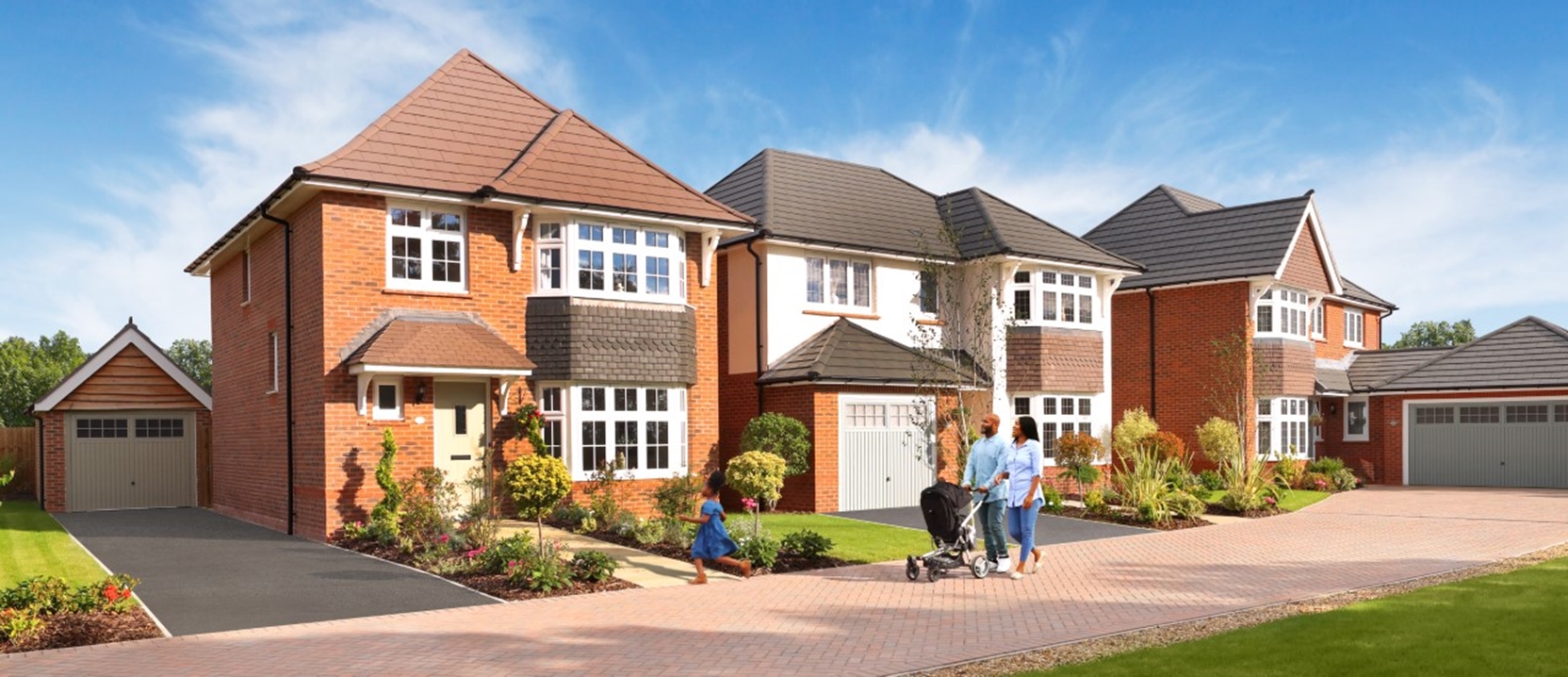
Customer & Marketing Strategy
The Customer & Marketing team was formed in July 2019. Although a common structure across retailing, we believe it’s the first time a housebuilder has brought together Sales & Interiors, Marketing, Customer Service and Communications within a single team.
This approach has already paid dividends in a number of ways. It has allowed the combined team to better manage the end-to-end customer experience, becoming even more agile around the needs of Redrow homebuyers.
More efficient sharing of customer & market intelligence has also enabled the team to create better solutions for the business and customers. Two examples of this were the team’s preparations for changes to the government’s Help to Buy scheme and innovations to support customers during Covid-19.
We investigated the views of 2,000 UK adults on their home buying preferences and found that the pandemic has in fact encouraged many people across the country to reassess how they want to use the space in their home, and what community features and facilities they want to be surrounded by.
In terms of home renovation we found that the more significant the home renovation project, the less satisfied homeowners tend to be with the results.
For example, just 38% of those who spent more than six months on a renovation project were likely to do so again on a future project. As well as unsatisfactory results, consumers frequently reported going over budget, with almost 40% stating that they had spent more than originally planned.
This research highlighted a significant opportunity for Redrow to target the second hand market, with our market-leading Heritage range and Redrow 8 placemaking principles. This is a key strategy to mitigate changes to the current Help to Buy scheme.
This insight has led to the ‘why do up, if you can buy new’ campaign. An integrated marketing campaign, it highlights the inconvenience and stress of renovating a second hand property versus buying a Redrow home, with modern open plan living, timeless exteriors and green public spaces.
We have also taken into account the social trend of increased home working with our Interiors team with more rooms dressed to highlight flexible home working spaces.
Reservations and Order Book
The Group secured £1.6bn of private reservations in the year (2019: £1.7bn). As a result of a strong sales performance earlier in the financial year and the significant shortfall in legal completions in the final quarter, the Group ended the financial year with a record total order book of £1.4bn, a 40% increase on the prior year (2019: £1.0bn).
Agility Around Our Customers
The onset of Covid-19 has highlighted our market advantage in digital and online services and the ability of the Redrow team to re-engineer customer processes at speed. Whilst lockdown was underway, the Customer & Marketing team liaised closely with Health & Safety, IT Learning & Development colleagues to ensure the customer experience fully incorporated best practice when it came to social distancing and reducing the spread of Covid-19.
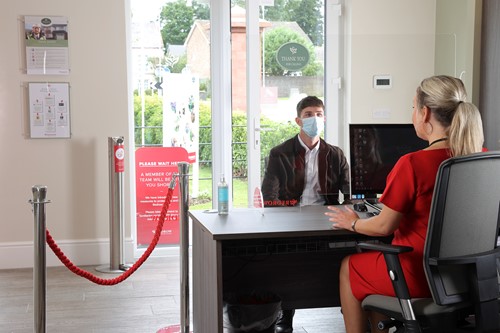
Hard copy collateral was removed from sales centres with sales consultants using their dedicated iPads to display interactive content to customers on big screens. Videos were put together highlighting the new sales centre visit experience and the process for a Redrow Technician visiting a customer occupied home to carry out a repair.
These films have been viewed thousands of times and have been shared as best practice both within and outside the housebuilding industry. We quickly introduced virtual zoom calls for customers at different points during the journey. Delivered by Sales Consultants, they can also provide 3D virtual tours to customers, talking them through optional extras and fittings.
Our Site Management teams also moved quickly to offer the popular Hard Hat customer visits as a virtual option. If customers don’t want to physically visit site, they can still view their homes at pre-plaster stage giving them the opportunity to see the quality of the build from the inside out.
Our inhouse IT teams also amended our inspection apps for customers to carry out their own Home Preview pre-completion visit around their home, whilst maintaining social distancing from Redrow colleagues. Customers can take pictures of any issues in their home and upload them to the Redrow iPad, before handing the device to the waiting Redrow Customer Service Manager who will then ensure any issues are resolved.
Rebecca and Martin purchased their first home together while in lockdown from their home in Falkirk, Scotland. The couple moved to Scotland seven years ago while pregnant with their daughter and have since had a little boy, but decided it was time to move back to England to be closer to their family based in Essex.
Rebecca commented, “Purchasing our new Redrow home during lockdown was quite a bizarre, but exciting process. We had begun our online search looking for homes in Essex but started branching out further as we love the idea of living close to the coast. We found a selection of Redrow homes in Herne Bay in Kent and got in touch with the sales team at their Sunningdale Green development to see if we could view the home remotely.
“Our virtual tour took place in early May and was carried out via a WhatsApp video call. The home we were interested in was finished so our tour started in the cul-de-sac and took us up the driveway to give us a feel for the street and the outside of the property. Once inside we were shown around the four bedroom property and really loved what we saw. Leon, our sales manager, who conducted the virtual tour was fantastic, nothing seemed to be too much trouble and we felt really reassured about the quality of the home and the service we would receive throughout the homebuying process.”
“After the call, Redrow sent through a video of the property giving us the opportunity to re-watch it in our own time, pause and zoom in at certain points. We decided to reserve the home two days later. It is going to suit our family perfectly.”
Although Rebecca and Martin are first-time buyers, they had been renting their home in Falkirk from Rebecca’s parents, and handled the sale of that property on their behalf.
Rebecca continued, “We sold the home we are living in for my parents via a WhatsApp video call in March and also shared the video with the buyers afterwards. It is great that technology enables you to buy and sell property remotely.”
The family are looking forward to a summer by the English coast before enrolling their children in a school in Whitstable for the start of the new term.
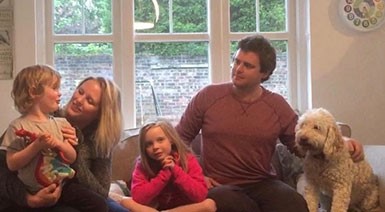
Engaging with Customers and Communities Online
We were pleased to once again secure the HBF Five Star Excellence Award, with our performance trending above the majority of the major housebuilders. Throughout the course of the year we have consistently been rated as ‘excellent’ on Trustpilot, with individual colleagues across the business highlighted by customers for going the ‘extra mile.’
We have invested in new technology to bring all our customer review content into one place to better manage, review and analyse all customer feedback. This will also create a more seamless way of ensuring that customer feedback is consistently fed back into product and service design.
Social media is another key way of engaging with customers and communities and receiving feedback. For nearly four years, we have been utilising Crowd Control HQ technology, which enables over 100 colleagues across the business to respond to customers on social media after a validation from the central communications team.
This approach enables local divisional teams to manage the whole relationship with the customer and to provide meaningful responses via social media. This approach has delivered customer average response time of just over one hour on social media.
Having taken the decision to temporarily close our sales offices during lockdown, we found ourselves in the privileged position of being able to help the army of doctors, nurses, health workers and care staff who are engaged in the real battle against this deadly disease.
Our Redrow colleagues quickly identified ways that they could get involved in supporting the mammoth effort being made by NHS trusts around the country, in particular contributing to keeping them safe while working and ‘looked after’ when off-duty.


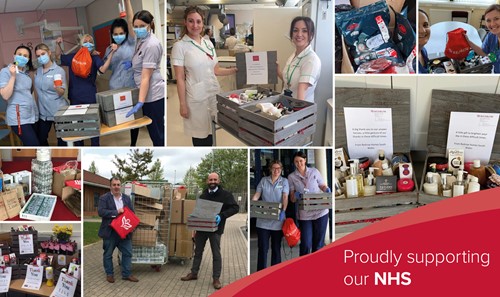
Redrow teams across England and Wales have donated much-needed protective clothing and masks to a variety of hospitals, including the new 4,000-bed emergency Nightingale Hospital that’s been created at ExCel, in East London. Masks and antibacterial hand wash also went to St James’ University Hospital in Leeds, affectionately known as Jimmy’s.
Colleagues across the country are volunteering and giving their time to support our NHS where possible. Nalab from our Eastern team has volunteered to deliver vital medication to vulnerable people and also provide transportation to and from the hospital.
Decommissioned show homes at one of our developments in Basildon, Essex, were opened up to be used by staff from the neighbouring hospital, giving them a place to rest between shifts without the need to travel.
Redrow colleagues also delivered furniture and accessories to Basingstoke and North Hampshire Hospital, where they were used to create a much-needed new rest area for staff.
Meanwhile our South Wales team helped to make up hampers of essentials and other goodies for patients at the University Hospital of Wales in Cardiff following a request from nurses. Our Yorkshire team were quick to follow suit and donate PPE, a hamper full of essentials, goodies and even some colouring books for children to Pindersfield Hospital in Wakefield. They also gave defibrillators to Yorkshire Ambulance Services.
In the North West, Wrexham Maelor Hospital put out an urgent appeal for protective shoe covers on social media. Our team were quick to gather up and deliver as many boxes as they could find and then also managed to put together some luxury hampers which they gave to Wrexham Maelor, The Countess of Chester, Arrowe Park and Aintree hospitals.
We also backed the NHS contractorsappeal.com and joined the hundreds of thousands of people who gathered on their doorsteps every Thursday evening at 8pm to ‘Clap for our Carers’, showing our appreciation for health workers everywhere.


